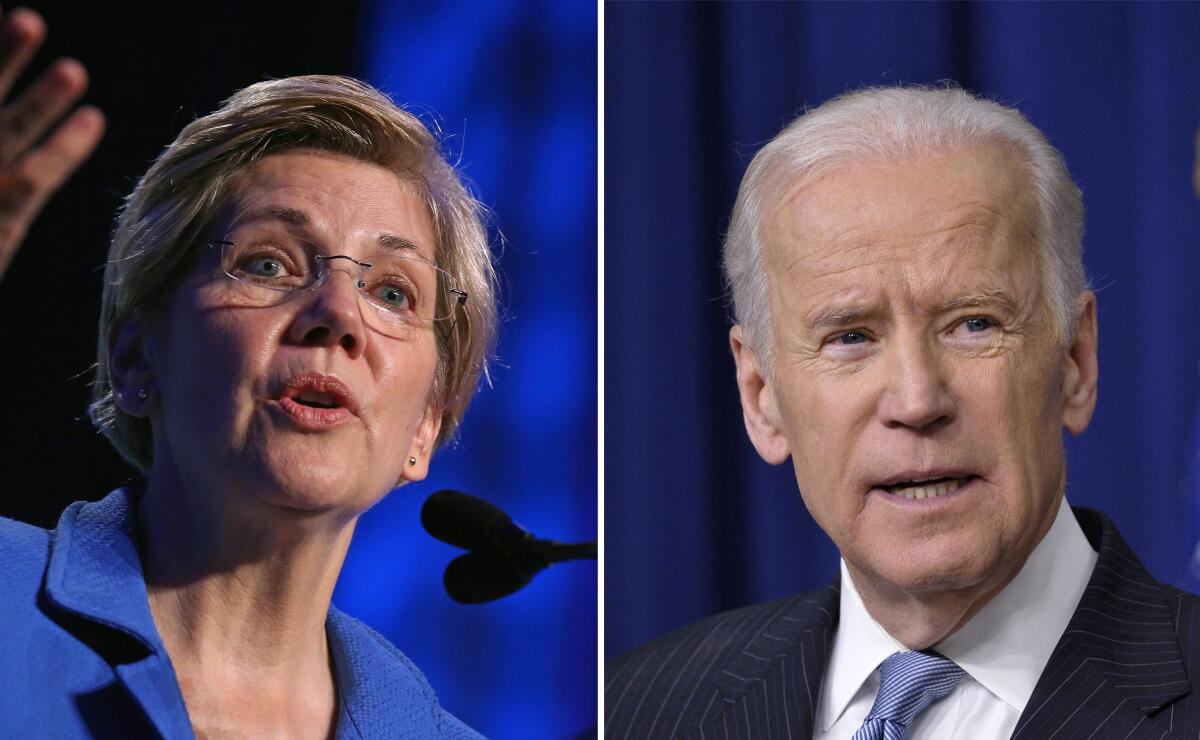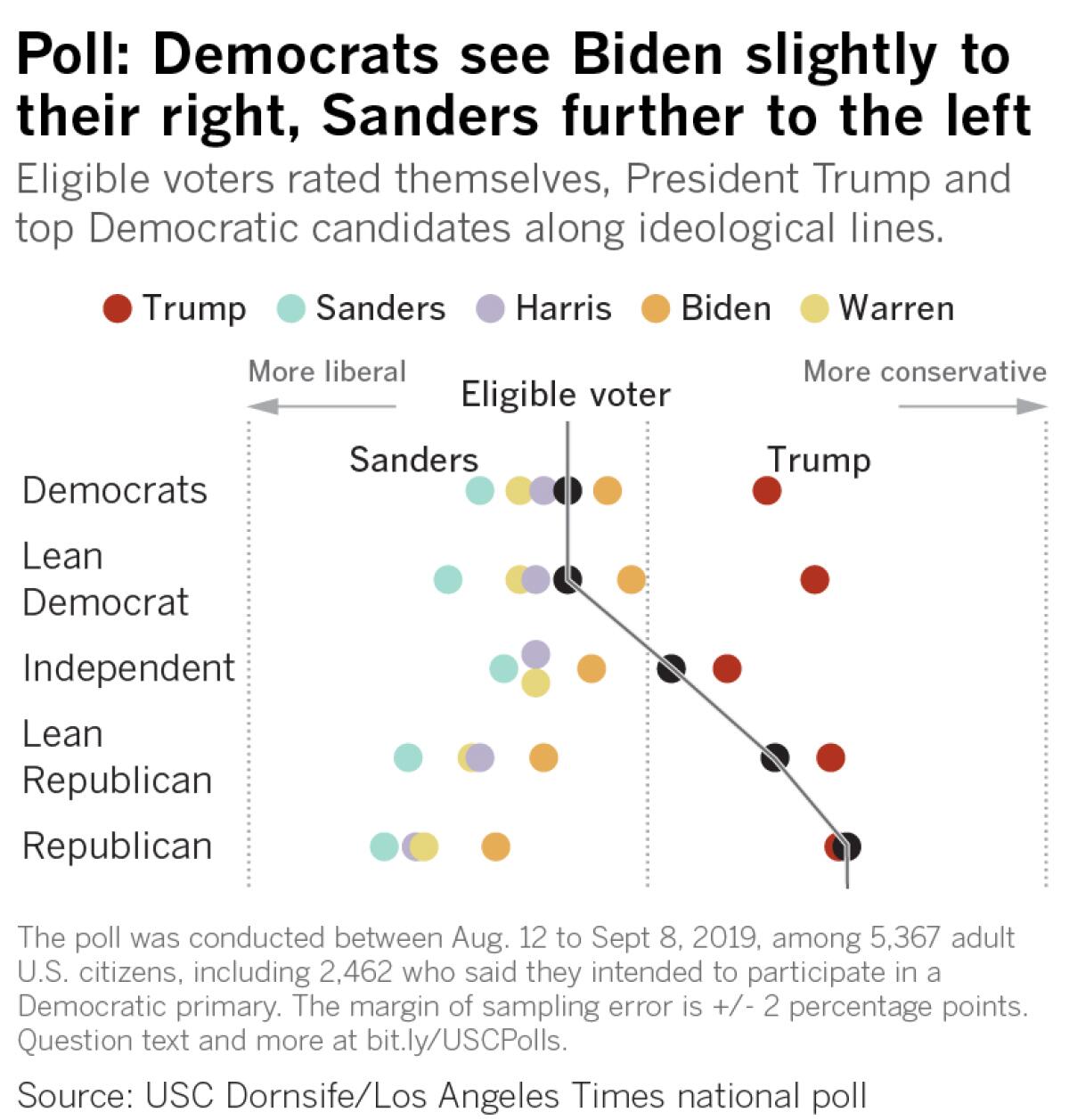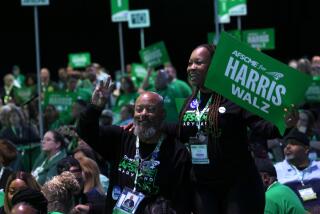Democrats see Biden, Warren as close fits ideologically, view Sanders as more extreme

WASHINGTON — Democratic primary voters nationwide see former Vice President Joe Biden and Sen. Elizabeth Warren as relatively close to their own political views but regard Sen. Bernie Sanders as significantly further to their left, a new USC Dornsife/Los Angeles Times poll shows.
The Democrats see Biden as slightly more conservative than themselves and Warren as slightly more liberal, the poll found.
As with other recent surveys, the latest USC/L.A. Times poll shows Biden, Sanders and Warren as the top choices for Democrats nationwide, with Warren having moved into an approximate tie with Sanders for second place behind Biden. Sen. Kamala Harris has faded, having lost many of her supporters after a surge earlier in the summer.
Among the lead trio, Sanders has a couple of significant disadvantages, the poll indicates.
Ideology is one factor that goes into how voters choose whom to support — though not necessarily the deciding one. In the past, candidates seen as on the ideological extremes have often faced problems; Sanders’ status as the outlier in the Democratic field could limit his ability to expand his support.
Another problem for the senator from Vermont is engagement: Sanders does best among people who did not watch or listen to the last debate, the only candidate for whom that’s true.
Warren’s backing shows the opposite pattern. The Massachusetts senator does best among voters who watched or heard about the July debate. Her steady growth in support since the spring has come through consolidating the backing of college-educated white liberals. She has managed to match many of Sanders’ positions without being perceived by voters as being as far to the left, the poll finds.

The Biden-Warren matchup, which many Democratic insiders think could be the final bracket of the primary contest, has begun to resemble a familiar pattern.
Democratic primaries have often featured an insurgent with strong backing from white, college-educated voters challenging an establishment-backed candidate with significant blue-collar and African American backing: Gary Hart versus Walter Mondale in 1984 and Paul Tsongas against Bill Clinton in 1992 are two examples of such “wine track” versus “beer track” races.
While this year’s contest differs from those in many ways, it has one big similarity: Warren, like the “wine track” candidates of previous years, needs to find a way to broaden her support, especially among African American and Latino Democrats.
Warren tied Biden with white college graduates at 23%, and was also essentially tied with him among the most liberal quarter of Democratic voters.
But her support fell to 9% among whites who did not graduate from college, 6% among nongraduates of all races, 3% among all African Americans and 7% among all Latinos, the poll found.
Warren “can’t have 6% of people without college degrees for her” and win, said Bob Shrum, director of USC’s Center for the Political Future, which cosponsored the poll. “She needs to build that up.”
The findings also offer some backing to Biden’s argument that he would give the Democrats their strongest chance in an election against President Trump: Potential swing voters in the general election see Biden as relatively close to their own position but view the other leading Democrats as further to the left, the poll finds.
Poll: Biden, Sanders and Warren are frontrunners among Democratic voters
Support for former Vice President Joe Biden has remained relatively flat between polls, while Warren is the only candidate who has consistently gained support since April.
| Candidate | April poll | July poll | August poll |
|---|---|---|---|
| CandidateJoe Biden | April poll27% | July poll29% | August poll28% |
| CandidateBernie Sanders | April poll16 | July poll11 | August poll13 |
| CandidateElizabeth Warren | April poll4 | July poll10 | August poll11 |
| CandidateKamala Harris | April poll7 | July poll10 | August poll8 |
| CandidatePete Buttigieg | April poll2 | July poll5 | August poll4 |
| CandidateBeto O'Rourke | April poll7 | July poll3 | August poll3 |
| CandidateCory Booker | April poll2 | July poll1 | August poll2 |
| CandidateAndrew Yang | April poll1 | July poll1 | August poll2 |
| CandidateAmy Klobuchar | April poll1 | July poll1 | August poll1 |
| CandidateTulsi Gabbard | April poll1 | July poll0 | August poll1 |
| CandidateUndecided | April poll27 | July poll25 | August poll24 |
The poll was conducted between Aug. 12 to Sept 8, 2019, among 5,367 adult U.S. citizens, including 2,462 who said they intended to participate in a Democratic primary. The margin of sampling error is +/- 2 percentage points. Question text and more at bit.ly/USCPolls.
Source: USC Dornsife/Los Angeles Times national poll
The poll also finds:
• Healthcare policy, which has been a big focus for arguments at the Democratic debates, has not become a litmus test for voters.
The poll asked potential Democratic primary voters whether they support a “Medicare for all” plan that would do away with private insurance, as backed by Sanders and Warren, or a plan that would allow people to either buy into Medicare or keep their existing insurance, as Biden advocates. The largest group, more than 4 in 10, said they support both. An additional 19% support only the optional plan, while 14% support only the full public plan, and 19% haven’t heard enough to say.
Among potential voters in the general election, the results are less equivocal: The Medicare option draws wide support; the full public plan generates greater opposition. By 48% to 14%, with 38% uncertain, potential general election voters support the option; the full public plan draws 39% in favor, 34% opposed and 26% uncertain.
Support for and opposition to Medicare for all divides deeply along partisan lines, while the Medicare option does not, noted Jill Darling, the survey’s director. But if the Medicare option becomes a general election issue, views could polarize, and many of those currently on the fence could shift against it, she said.
For now, however, the poll suggests that advocating an end to private insurance “could easily be a real burden for Democrats in the general election,” said Shrum.
• A ban on certain types of semiautomatic rifles coupled with a plan to buy back those already in private hands gets widespread support. Several countries have adopted bans plus buybacks, most recently New Zealand, and Democratic candidates are increasingly advocating it. Potential voters support the idea, 56% to 31%.
A majority of Republicans oppose it, however, with more than a third saying they are “strongly opposed.” That’s enough to all but ensure that the Republican-majority Senate would block such a plan.
• A close divide on whether it is fair or unfair to blame Trump’s language for encouraging extremists to commit violent acts.
Just over 4 in 10 call that fair criticism, while just under 4 in 10 say it is unfair. The rest say they hadn’t heard enough to say.
Currently, Biden leads the field, as he has in all three USC/L.A. Times polls this year. He has the backing of 28% of Democratic voters, the poll indicates. Sanders, with 13%, and Warren, with 11%, come next.
Democratic voters overall view California Sen. Harris as nearest to their own position ideologically, the poll found, but she has returned to single digits, at 8%. The poll showed Mayor Pete Buttigieg of South Bend, Ind., at 4%, former Rep. Beto O’Rourke of Texas at 3%, and both Sen. Cory Booker of New Jersey and New York entrepreneur Andrew Yang at 2%. No other candidates get more than 1%.
The race remains fluid, however. The USC/L.A. Times poll uses a panel of more than 7,000 American citizens of voting age, allowing their responses to be tracked over time. Across the three polls this year — in April, July and the current survey — about 1 in 4 have had a different favorite candidate each time. The share that have consistently backed the same candidate in all three polls is only slightly higher.
About 1 in 4 say they are undecided. The ideological position of those undecided voters is closer to how voters perceive Biden than to any of his major rivals, which could give the former vice president an additional cushion.
To measure ideology, the poll asked respondents to rate themselves, Trump and the top Democratic candidates on a scale of 0 to 100, with 0 as the most liberal and 100 the most conservative.
On average, those who said they expected to vote in a Democratic primary rated themselves as somewhat left of center, at 40. They rated Biden a bit to their right, at 46, and Warren roughly the same distance to their left, at 34. Sanders was rated at 28 — the farthest to the left of the four candidates tested — and Harris was at 37.
Regardless of which candidate they supported, Democrats perceived Sanders as being to their left. Backers of Biden and Harris, as well as undecided voters, all saw Sanders as the candidate farthest from their own ideology.
Looking ahead at the potential general election, the poll finds that swing voters — those who describe themselves as independent or only leaning toward one party or the other — see themselves as very close to the center and view both Trump and Biden as relatively close to themselves ideologically.
Those swing voters, however, regarded Sanders, Harris and Warren as all significantly further to their left, with Sanders being the farthest.
This USC Dornsife/Los Angeles Times poll was conducted from Aug. 12 to Sept. 8 among 5,367 adult American citizens, including 2,462 who said they planned to vote in a Democratic primary. The margin of error is 2 percentage points in either direction for the full sample and for the Democratic sub-sample.
Respondents were drawn from a probability-based panel maintained by USC’s Center for Economic and Social Research for its Understanding America Study. The poll was conducted in partnership with, and funded by, the USC Dornsife Center for the Political Future. Responses among all eligible voters were weighted to accurately reflect known demographics of the U.S. population. A description of the methodology, poll questions and data, and additional information about the poll are posted on the USC website.
More to Read
Get the L.A. Times Politics newsletter
Deeply reported insights into legislation, politics and policy from Sacramento, Washington and beyond. In your inbox three times per week.
You may occasionally receive promotional content from the Los Angeles Times.











